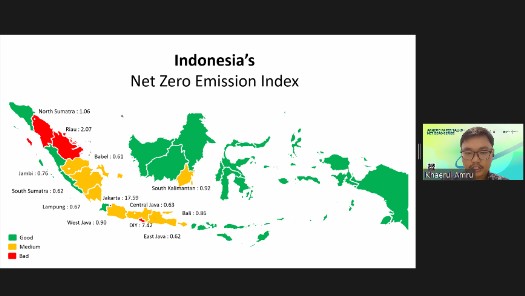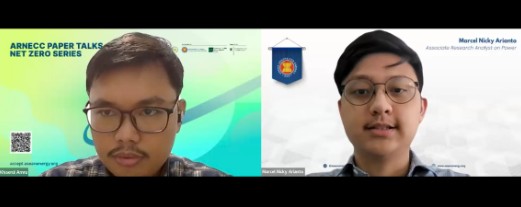i
i
Zoom, 25 January 2024
The ASEAN Climate Change and Energy Project (ACCEPT) Phase II continued its mission toward a sustainable future by exploring the significance of the net-zero emission index in different areas. This commitment was presented through launching the third episode of ARNECC Paper Talks 2.0 – Net Zero Series on January 25, 2024. Mr. Khaerul Amru from Badan Riset dan Inovasi Nasional (BRIN) shared valuable insight in the publication titled “Analysis of Net Zero Emission Index for Several Areas in Indonesia Using Individual Carbon Footprint and Land Use Covered” moderated by Mr. Marcel Nicky from ASEAN Centre for Energy.

Photo 1. Presentation by Mr. Khaerul Amru
Mr. Khaerul provided a comprehensive overview of the study’s focus on analyzing the net-zero emission index for various areas in Indonesia. The study aimed to assess emissions and absorption in each region, driven by global concerns over climate change and Indonesia’s commitment to reducing greenhouse gas (GHG) emissions by specific percentages by 2030. With a descriptive quantitative approach, the study incorporated primary data from satellite imagery interpretation for assessing carbon sequestration based on land cover, along with secondary data from Aksara Bappenas and RAD-GRK for regional carbon emissions and uptake.
The study further explored individual carbon footprints for each area, calculated by dividing carbon emissions by the total population. The national calculation of the carbon index covering all provinces revealed a deficit in carbon sequestration relative to emissions. Notably, specific provinces with dense populations, such as DKI Jakarta, DI Yogyakarta, North Sumatra, and Riau, exhibited a net-zero emission index greater than 1, indicating a surplus of emissions compared to absorption. Mr. Khaerul highlighted the need to develop targeted strategies to enhance sequestration and reduce emissions in specific regions. Since development in Java and Sumatra is relatively higher than other areas in Indonesia, Mr. Khaerul stated that carbon sequestration must also be more present in those areas. These findings contribute valuable insights for policymakers and stakeholders to formulate effective strategies for achieving net-zero emissions in Indonesia.

Photo 2. Discussion session with Mr. Khaerul Amru and Mr. Marcel Nicky
In the enlightening discussion with Mr. Khaerul Amru, key insights emerged regarding the importance and practicalities of achieving net zero emissions. Mr. Khaerul outlined the significance of the net zero emissions index in the broader context of climate change, highlighting the ongoing efforts in the region to understand and implement policies toward a sustainable future. The comprehensive guidelines and policies allowed each region to tailor its approach for evaluating and aligning with net zero emissions. Mr. Khaerul highlighted the impactful introduction of Indonesia’s Forest and Other Land Use (FOLU) Net Sink 2030 by the Ministry of Environment and Forestry—an initiative contributing significantly to carbon absorption and economic growth. Furthermore, he also emphasized the study serves as a valuable reference for policymakers to formulate environmentally conscious policies. Utilizing remote sensing data, mainly through LANDSAT 8 satellite imagery, the study showcased its efficacy in monitoring the net-zero emission index by interpreting changes in land cover over the years.
The discussion shifts to the pressing need to increase sequestration driven by the current imbalance between carbon emissions and sequestration. In examining strategies, Mr. Khaerul provided perspectives tailored to specific regions’ net zero emission index. Mr. Khaerul emphasized the essential role of maintaining land cover to optimize sequestration benefits for those regions classified as green, representing a favorable net zero emission index. In contrast, for regions labeled as yellow with a moderate net zero emission index or red with a poor net zero emission index, Mr. Khaerul outlined a dual approach. Firstly, there was a strategy for expanding the sequestration area through forest replanting, with a spotlight on the exceptional sequestration capacity of mangroves. Simultaneously, Mr. Khaerul highlighted the adoption of low-carbon technologies for emissions reduction.
As the session drew to a close, Mr. Nicky expressed sincere gratitude to Mr. Khaerul for sharing invaluable insights during the discussion. He highlighted the significance of ARNECC Paper Talks as a dynamic platform fostering collaborative engagement within the energy-climate sector. Mr. Nicky encouraged all participants to commit to exploring intricate topics and nurturing a collective dedication to excellence, efficiency, and innovation. He urged for a sustained exchange of knowledge and an unwavering dedication to addressing the challenges within the field, ensuring a continuous and impactful contribution to the discourse on energy and climate.
Join our ASEAN Researchers Network on Climate Change (ARNECC) by registering yourself here. Become a part of our collaborative efforts to address pressing climate challenges and shape a sustainable future.
Detailed information on ACCEPT II can be found at https://accept.aseanenergy.org/
We welcome any future collaboration, please feel free to contact us at [email protected]